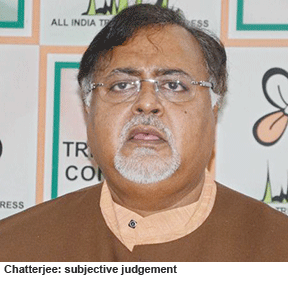SHORTLY AFTER THE trinamool Congress party, which ended the 34-year uninterrupted rule of the Communist Party of India-Marxist (CPM)-led Left Front coalition in West Bengal (pop. 91 million) in the summer of 2011, was installed in Writers Building, Kolkata, a 19-member school syllabus reform committee was appointed by chief minister Mamata Banerjee to sanitise school texts of communist propaganda and declare Marx and Engels non-persons in the history texts of higher secondary students. Its suggestions were accepted with alacrity by the West Bengal Council of Higher Secondary Education (WBCHSE). But since then arbitrary changes in school texts decreed by the incumbent Trinamool government dominated by its mercurial chief minister, have disappointed the academy in West Bengal.
 Following the chief minister’s lead, Partha Chatterjee, the newly appointed (May 27) education minister of West Bengal, scrapped several projects initiated by his predecessor Bratya Basu. Soon after his appointment, Chatterjee scrapped the collegiate online admission system introduced by Basu, citing lack of infrastructure in state government colleges. Again a month later on June 27, Chatterjee directed WBCHSE to withdraw the class XII Bengali language textbook, Bangalir Bhasha O Sanskriti (‘The Language and Culture of Bengali People’), from schools on grounds that it contains factual errors and gives less importance — in his subjective judgement — to luminaries of Bengali music.
Following the chief minister’s lead, Partha Chatterjee, the newly appointed (May 27) education minister of West Bengal, scrapped several projects initiated by his predecessor Bratya Basu. Soon after his appointment, Chatterjee scrapped the collegiate online admission system introduced by Basu, citing lack of infrastructure in state government colleges. Again a month later on June 27, Chatterjee directed WBCHSE to withdraw the class XII Bengali language textbook, Bangalir Bhasha O Sanskriti (‘The Language and Culture of Bengali People’), from schools on grounds that it contains factual errors and gives less importance — in his subjective judgement — to luminaries of Bengali music.
Interestingly, the impugned textbook contains a chapter Jibon Mukhi Gaan (‘Realistic Songs’), which praises former Trinamool Congress MP Kabir Suman for his contributions to the genre. A Kolkata-based modern Bengali singer-lyricist and musician, Suman contested the Lok Sabha election of 2009 on a TMC ticket from Jadavpur constituency. He was subsequently suspended from the party after he fell out with Mamata on several issues including his support for withdrawal of security forces from the Maoist-hit ‘junglemahal’ in South Bengal. Unsurprisingly, he was not fielded as a candidate by TMC in the 2014 Lok Sabha poll.
The controversy deepened with a member of the syllabus committee pointing out that a mail was sent to the president of WBCHSE at least three months ago, highlighting numerous errors in the textbook published by Orient Blackswan. Questions are now being raised as to why the council went ahead and printed the book, and why former minister Basu allowed it to be published.
Rejecting charges that the textbook has been withdrawn because of the chapter on Kabir Suman, now in the bad books of the chief minister, Chatterjee insists that the book is replete with errors. Asked why he and not WBCHSE — an autonomous body mandated to supervise secondary education in the state — has taken the decision to withdraw the textbook, Chatterjee said: “Though an autonomous body, its activities have a bearing on the government and people find fault with the government.”
As the new academic year commenced in January and a pre-test is scheduled for August, withdrawal of the textbook has left over 800,000 class XII students across the state in the lurch, seven months before the higher secondary examination. Students preparing for the class XII school-leaving exam now have to wait for another textbook to be approved, printed, and released in the market.
According to Dr. Prasenjit Chattopadhyay, professor of English at the Sree Chaitanya Mahavidyalaya (North 24 Parganas), it’s plain that Chatterjee’s proscription of the textbook was prompted by the Kabir Suman chapter in the book. “Though there are claims about withdrawing the book to improve it, the reality is that references to the defiant rebel, must be eliminated. Such arbitrary interference with textbooks regardless of their impact on lakhs of students is not only unprecedented but portends a perilous predicament for education in West Bengal,” says Chattopadhyay.
But in a state where the primacy of politics is a given, little sleep is likely to be lost over this prediction.
Baishali Mukherjee (Kolkata)



























